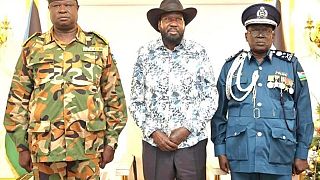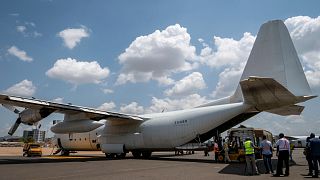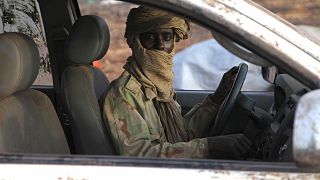South Sudan
He became their vessel used to help at a very crucial season of their life.
Every week at Parolinya camp in northern Uganda, Bishop Emmanuel Murye’s congregation – made up mostly of South Sudanese refugees, meet under a tree for Sunday service.
They came at the start of 2017 from their homes in Kajo Keji, South Sudan – as the government and two rebel groups battled for control in a war sparked by a feud between President Salva Kiir and his former deputy Riek Machar.
Bishop Murye had been installed as the new Anglican bishop of Kajo Keji county just days before the fighting broke out.
He sheltered dozens of families in his church compound until the fighting died down. Thousands of people fled to Uganda.
Murye stayed and organized trucks to carry over 100 people across the border.
Kajo Keji became a ghost town – almost everyone left and Bishop Murye decided to follow his church.
“The kind of test of my faith and maybe of my leadership is when the people move out in big number and I was left with no people and it was terrible, all people moved out. And as a Bishop, as your Bishop also, I could not stay there, it is a great temptation and I was asking God ‘why, why am I consecrated, called a leader at this time’. And even the government, the army barracks, they expect us to be there. But the only thing we did actually was, we could not stay there without people because I was called to be leader of people, not a custodian of the soil, of the tree or of the houses, but I have to take care of the people,” he said.
The four-year war in oil-rich South Sudan, a country only founded in 2011, has forced more than a third of its 12 million citizens to flee their homes.
Tens of thousands have died, some in ethnic killings, others from starvation and disease.
Palorinya is the second biggest camp in northern Uganda after Bidi Bidi and alone houses 185,000 refugees.
Bishop Murye was also instrumental in negotiating the release of prisoners of war.
Government forces rounded up men suspected of being linked to the rebels – with reports of torture, disappearance, and murder.
Murye says he met with army commanders in Kajo Keji and secured the release of over twenty men. He also helped free men held by rebel forces.
“We told them the position of the church, we are a church and we are neutral. Both of you are ours, whether in the government or in the opposition. So what we need is, you don’t need to torture somebody without reason and some of these people were arrested without, they are not soldiers, actually they were innocent people,” he said.
Sixty five-year-old Goi Luga Elujai was picked up by rebel fighters and accused of spying for the government. He was taken to a camp where he says he was tortured and left for dead before being released.
Now, due to his injuries he is unable to do anything to support his family.
“I was abducted and tied with chains. At the same time they wanted to burn my navel and I resisted, I turned to my right like this so they burnt me with a hot machete and fire. On the leg was the hot machete and on the stomach was fire,” he said.
Evans Pere was arrested by government forces from his home. The 47-year-old was locked in a container for three months then released.
“I wanted to thank the Bishop sincerely for his ample time that he spent following up my case and following up other people’s cases who are alive today. Without him many of us would have died, many of us would have been killed,” he said.
The U.N. refugee agency and the World Food Programme (WFP) said they are millions of dollars short of funding to help refugees last year.
Bishop Murye regularly crosses back into South Sudan, organizing church convoys that bring food and other aid across the border to displaced people hiding out in Kajo Keji’s forests.













01:33
The ripple effect of Trump's budget cuts on refugee camps in Kenya
01:56
EU foreign ministers discuss deal with Israel to increase Gaza aid
01:25
MSF: Access to healthcare in Sudan 'almost impossible' as attacks on healthcare facilities increase
01:55
US contractors say colleagues fired live ammunition at Palestinians seeking food
01:10
Young South Sudanese player selected for NBA basketball team
01:50
UN urges renewed political and climate action in Libya amid humanitarian and governance crises